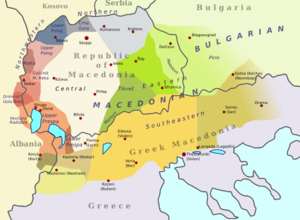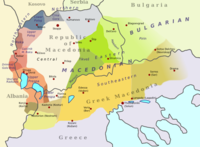| Revision as of 07:23, 23 September 2020 editFuture Perfect at Sunrise (talk | contribs)Edit filter managers, Administrators87,192 editsm rv, unsourced and unexplainedTag: Rollback← Previous edit |
Revision as of 11:24, 13 March 2021 edit undoWikiEditor50 (talk | contribs)Extended confirmed users64,745 edits Reference edited with ProveItTag: ProveIt editNext edit → |
| Line 9: |
Line 9: |
|
| description2 = Tale told by a woman from the city of ] |
|
| description2 = Tale told by a woman from the city of ] |
|
}} |
|
}} |
|
The '''Prilep-Bitola dialect''' ({{lang-mk|Прилепско-битолски дијалект}}, ''Prilepsko-bitolski dijalekt'') is a member of the central subgroup of the western group of ] of the ]. This dialect is spoken in much of the ] (more specifically, the ], ], ] and ]), as well as by the ] population in and around ] (Lerin)<ref>'''author missing'''. Леринскиот говор. Македонски jазик, 1983, XXXIV, стр. 23-49.</ref><ref>Hill, Peter. The Dialect of Gorno Kalenik 1991, Columbus, OH</ref> in neighbouring ]. The Prilep-Bitola dialect, along with other peripheral west-central dialects, provides much of the basis for modern ].<ref>Makedonska gramatika by Krume Kepeski |
|
The '''Prilep-Bitola dialect''' ({{lang-mk|Прилепско-битолски дијалект}}, ''Prilepsko-bitolski dijalekt'') is a member of the central subgroup of the western group of ] of the ]. This dialect is spoken in much of the ] (more specifically, the ], ], ] and ]), as well as by the ] population in and around ] (Lerin)<ref>'''author missing'''. Леринскиот говор. Македонски jазик, 1983, XXXIV, стр. 23-49.</ref><ref>{{Cite book |last=Hill |first=Peter |url=http://books.google.com/books?id=ibxiAAAAMAAJ |title=The Dialect of Gorno Kalenik |date=1991 |publisher=Slavica Publishers |location=Columbus, OH |language=en |via=Google Books}}</ref> in neighbouring ]. The Prilep-Bitola dialect, along with other peripheral west-central dialects, provides much of the basis for modern ].<ref>{{Cite journal |last=Lunt |first=Horace G. |date=1951 |title=Makedonska gramatika by Krume Kepeski |journal=Language |language=en |volume=27 |issue=2 |pages=180–187 |doi=10.2307/410435 |jstor=410435}}</ref> ] dialects have developed in the cities of ] and ]. |
|
Language, Vol. 27, No. 2 (Apr–Jun, 1951), pp. 180–187</ref> ] dialects have developed in the cities of ] and ]. |
|
|
|
|
|
|
==Phonological characteristics== |
|
==Phonological characteristics== |
| Line 31: |
Line 30: |
|
*intervocalic consonant ] is typical of this dialect, and elided forms are in ] with non-elided forms: |
|
*intervocalic consonant ] is typical of this dialect, and elided forms are in ] with non-elided forms: |
|
**elision of the intervocalic {{IPA|/v/}}: |
|
**elision of the intervocalic {{IPA|/v/}}: |
|
***in the plural forms of monosyllabic nouns, e.g. ''лебо(в)и'':<ref>Граматика на македонскиот литературен јазик, Блаже Конески, Култура, Скопје 1967, стр.68</ref> |
|
***in the plural forms of monosyllabic nouns, e.g. ''лебо(в)и'':<ref>{{Cite book |last=Koneski |first=Blaže (Блаже Конески) |title=Gramatika na makedonskiot literaturen jazik |date=1967 |publisher=Kultura <!--Култура--> |location=Skopje <!--Скопје--> |pages=68 |language=mk |script-title=mk:Граматика на македонскиот литературен јазик |author-link=Blaže Koneski}}</ref> |
|
::::{{IPA|/ˈlɛbɔvi/}} → {{IPA|/ˈlɛbɔi/}} (realized as {{IPA|}} ~ {{IPA|}}) |
|
::::{{IPA|/ˈlɛbɔvi/}} → {{IPA|/ˈlɛbɔi/}} (realized as {{IPA|}} ~ {{IPA|}}) |
|
::* and in most other positions, e.g. ''то(в)ар'':<ref>Историја на македонскиот јазик, Блаже Конески, Култура, Скопје 1986, стр. 21</ref> |
|
::* and in most other positions, e.g. ''то(в)ар'':<ref>{{Cite book |last=Koneski |first=Blaže (Блаже Конески) |title=Istorija na makedonskiot jazik |date=1986 |publisher=Kultura <!--Култура--> |location=Skopje <!--Скопје--> |pages=21 |language=mk |script-title=mk:Историја на македонскиот јазик }}</ref> |
|
::::{{IPA|/ˈtɔvar/}} → {{IPA|/ˈtɔar/}} (realized as {{IPA|}}) |
|
::::{{IPA|/ˈtɔvar/}} → {{IPA|/ˈtɔar/}} (realized as {{IPA|}}) |
|
:* certain short words (conjunctions, pronouns, determiners, etc.) have undergone further elision, ex.: |
|
:* certain short words (conjunctions, pronouns, determiners, etc.) have undergone further elision, ex.: |
| Line 59: |
Line 58: |
|
*] verbs are typically derived from ] verbs by means of the suffix –ва (e.g. ''зборва'' and ''боледва'') in Bitola dialects, but standard -ува in Prilep dialects; |
|
*] verbs are typically derived from ] verbs by means of the suffix –ва (e.g. ''зборва'' and ''боледва'') in Bitola dialects, but standard -ува in Prilep dialects; |
|
*'expansion' where other dialects have palatalization: ''падина'' ("to fall", sing. present third-person) versus the standard ''паѓа''; |
|
*'expansion' where other dialects have palatalization: ''падина'' ("to fall", sing. present third-person) versus the standard ''паѓа''; |
|
*use of the ] for proper names;<ref>Friedman, Victor (1998), Macedonian: Comparative Grammar, Slavic and East European Language Research Center (SEELRC): p. 22</ref> |
|
*use of the ] for proper names;<ref>{{Citation |last=Friedman |first=Victor |title=Macedonian: Comparative Grammar |date=1998 |pages=22 |publisher=Slavic and East European Language Research Center (SEELRC)}}</ref> |
|
*no distinction between masculine and feminine short possessive pronouns, i.e. consistent use of ''му'' and ''го'' for both genders, in Bitola dialects, but they are used in the plural third person in Prilep; |
|
*no distinction between masculine and feminine short possessive pronouns, i.e. consistent use of ''му'' and ''го'' for both genders, in Bitola dialects, but they are used in the plural third person in Prilep; |
|
*use of -јќум and -јким instead of the standard -јќи for the gerund, in older speakers, e.g. одејќум (while walking). |
|
*use of -јќум and -јким instead of the standard -јќи for the gerund, in older speakers, e.g. одејќум (while walking). |
The phonological characteristics of the Bitola-Prilep dialect which can also be found in the other peripheral dialects are:


